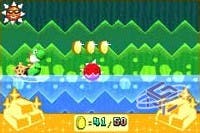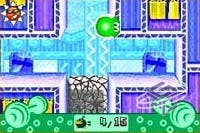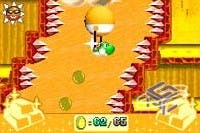Yoshi's Universal Gravitation
Pulling in the punters.
Although the DS has been around for a few months now (to the import gamers among you at least), it's perhaps telling that the games that have been occupying our time the most with Nintendo's new handheld have actually been GBA titles. Not that the DS games aren't good (although the best is definitely yet to come), but the quality of some of the GBA titles coming through from Japan has been outstanding. The force of Nintendo hype may well be focussed on telling us how much that touch screen and dual screen gaming are the future of handhelds, yet simultaneously the company has quietly been releasing some of the most imaginative and addictive handheld titles on the relatively humble GBA.
For proof look no further than WarioWare Twisted!, a crazed collection of minigames of such intensely amusing quality that therapists should prescribe it as an anti-depressant. Having spent much of last month doing things too bizarre for public transport (possibly its only drawback), another GBA title has emerged in the shape of Yoshi's Universal Gravitation that's similarly guaranteed to provoke quizzical looks from anyone in the vicinity as you wobble your handheld to and fro to wrestle with a platform game of devilish simplicity and originality.
Charge those batteries

Following the recent mini procession of tilt sensor titles that have rolled off the Nintendo production line, YUG (as we'll shorten it to from now on) takes the simple tilt concept and applies it to a side-scrolling 2D platformer; not necessarily the most obvious use of the tech at hand, but certainly an effective one that delivers a unique and beguiling gaming experience that's eventually almost impossible to put down.
We say eventually because to begin with YUG appears childish and basic, and little more than a contrived tech demo. The essential premise varies from level to level, but involves negotiating four mini-levels on the way to a star; reach the star and you move onto the next sub-section until you eventually reach the final exit, which is identifiable for being a solid gold star. Some levels within each world involve merely collecting coins, while others task you with killing a certain number of enemies or perhaps reaching the final exit within a time limit, or later on a combination of enemy/coin collection within a time limit.
Mixing up the concept a little further, some levels throw in sections where Yoshi turns into a ball and must bounce his way through rocks on the way to an exit, or put him in a series of buckets which must be tilted in the right sequence to drop him from one to the next, while occasionally Yoshi ascends slowly in a lift to the top of a series of pathways, before dropping at high speed and tasking you with making the snap decision as to which shafts to plummet down in order to plunder the riches. It's full of good ideas, not least helped by the novelty of combining traditional D-pad run and jump controls with the left and right tilt activated movements which have a dramatic bearing on even the most simple-looking scenarios.
Might as well jump

As a result of tilting one way or the other, Yoshi can run up walls or make improbable leaps of faith that jumping from the normal perspective would never have been possible. Think of it as something pulling you back or pushing you on and it suddenly introduces a completely new challenge to even the most straightforward-looking platform negotiation.
To challenge you even further, certain platforms slide like an abacus, requiring a left-right tilt to slide you across to meet the next one, while others are suspended by chains and swing like a pendulums in response and must be caught at the right moment - with some even providing destructive or protective measure from the relentlessly hazardous environment; for example the rolling boulders or the rocks that swing on the end of a chain and smash walls blocking your progress. In a display of typically surreal imagination, progress may even require you to climb floating musical notes that you must hastily yet carefully hop between as they rise before they fade away, or control the level of the sea and guide Yoshi in a boat, rocking him to and fro collecting coins and trying to avoid getting stuck on dry land. For a mere side-scrolling platformer, developers Artoon pack more ideas and imagination inside the first few levels than probably any 2D platformer released in the past 10 years.
Yet the critical response thus far has been muted and it's hard to understand why. Admittedly the first few worlds are basic in the extreme and offer little in the way of challenge. Normally if you don't get them first time, repeat attempts will almost guarantee success; mainly because none of the levels are exactly big and a modicum of repetition will ensure you'll have learned most of what there is to know right from the off.
We swear it's true

But then once the first three worlds are out of the way it's an altogether different story and a tale that's one of intense addiction, skill, iron will, persistence and eventually satisfaction. The true test of YUG's worth was that no matter how badly we got stuck, we never once uttered a tetchy expletive or uttered exasperation at the 'rubbish controls' or 'terrible level design'. Sure, much of it was hard, but essentially it was fair on the basis that it was entirely down to you if you messed up, and this has to come down to the controls.
It doesn't get off scot-free though, with a few frustrating design decisions that made certain sections (notably the mid-game boss) exceptionally difficult thanks to, for example, pit spikes causing instant death, and the fact that when you've been hit you'll bounce into the air and subsequently fall through a solid platform that would have otherwise saved your sorry arse from falling into said pit of spikes and thus your instant death. But such bloody-mindedness is something of a rarity within YUG, and for the rest of the game it's simply a rather unique platform test that adds a whole new layer to an old idea and pulls it off very well indeed.
Being 2D and on the GBA evidently we're not here for the eye candy, and as anticipated it doesn't do anything that strays from the kind of polished cartoon Day-Glo that you expect from Nintendo first party titles. And it's the same with the audio; ditties to forget, but the sort of twinkly bob-alongs that remind you of a simpler more naive gaming age.
Stupid fun
The fact that Artoon manages to revive old ideas that have long since become stale and give them a completely new twist is a remarkable success story in a risk-averse era such as this. To report on not only a unique gaming experience but a successful one at that should be celebrated; not least from a publisher routinely backslapped for continually rehashing its back catalogue and whacking it out again at full price. Yoshi's Universal Gravitation does what every handheld game should. It provides a pick up and play experience that's a huge amount of fun, maddeningly addictive and one that perfectly fills in those bored little moments, and should keep even the most tired old cynic entertained for ages - if you'll let it.

